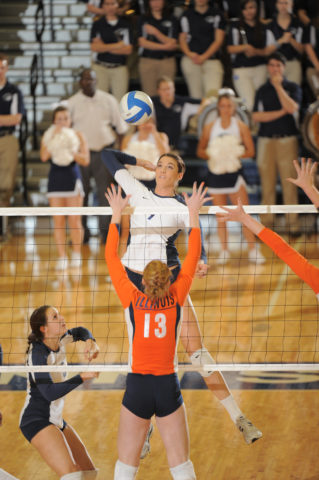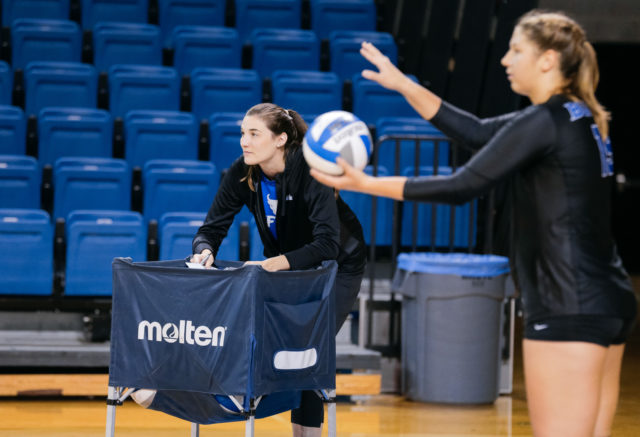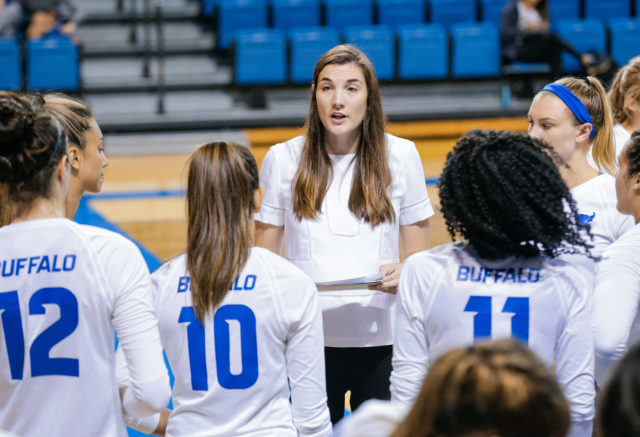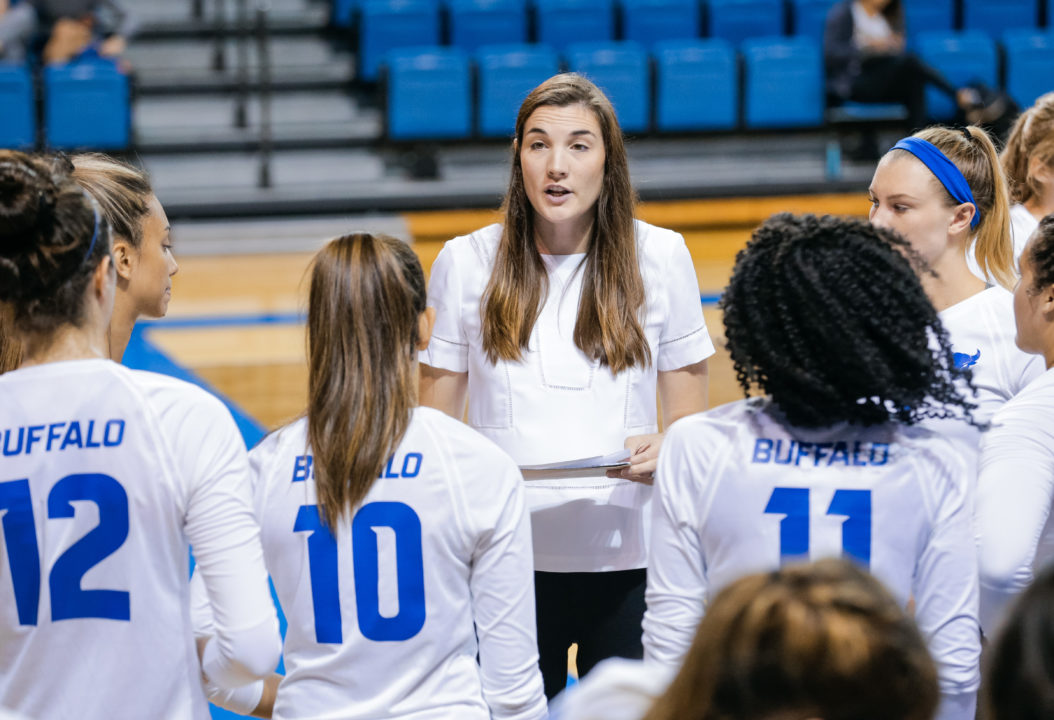Blair Brown Lipsitz had a storied career as part of the four-peat team at Penn State from 2007-10, which not only won four NCAA titles, but also managed an historic 109-match win streak. Brown was a three-time All-American, earning second team honors in 2008 and first team accolades in 2009 and 2010. The middle/opposite also garnered Big Ten Player of the Year and the Honda Sports Award in 2010.
After her collegiate career, Brown trained with the U.S. National Team and went on to play professionally in Europe (Italy and France) and Puerto Rico from 2011 to 2013.
The Purcellville, Virginia, native directed the U.S. Elite Volleyball Camp from 2011 to 2013, then spent a year as a volunteer assistant coach and TV analyst at Buffalo before taking over as the program’s head coach in 2015.
VolleyMob.com sat down with Lipsitz, who is to married former Penn State men’s volleyball All-American Max Lipsitz, to get her take on her career, her quick transition to coaching and the success her University of Buffalo Bulls are having thus far in 2017, already surpassing the previous two year’s win totals.
Obviously you had a storied career at Penn State, with much success playing for a legendary coach. What have you taken away from those experiences that you use as a coach?
I feel really fortunate to have gotten to play, not only with some of the incredible athletes I got to play with, but also to play for such incredible coaches while I was there. A lot of what we take from that is just the tradition. We wanted to build a culture here at UB and that is something that we tried to do from Day 1 when we got here. That is something that was instilled in us as athletes when we were at Penn State and we really wanted to pull that into our program.
How did playing for a Hall of Fame coach like Russ Rose affect the way you coach? What things did you take from his style or change from the way he approached the game to create your identity as a coach?
I think he makes all of his players tough. That is one of the main things that he can do with his players, and he can do that because he knows each individual athlete so well. He coaches everybody according to what they need to be the best person on the court and off the court, which is really, really special. So, that is something that I wanted to our team, to get to know each player that we have and to know what makes them tick and how to make them better people in the gym and out.
Coach Rose may appear to have a gruff exterior to the outside world. What was it like playing for him? What did you take from that experience that you can instill in your players?
I think what is really important to know about Coach is that we always knew that he cared. It wasn’t necessarily that he cared about winning, but that he cared about us as people. That is something that not everyone gets to see. I think part of that gruff exterior is just his honesty. You always knew where you stood and you could always trust him because he was completely honest with you all of the time.
The 109-match win streak was an unparalleled stretch in sport. What was it like to live inside of it and how did the process of getting there shape you?
I think we really tried not to focus on the numbers or on the streak because like Coach said streaks end and what you are left with is what you put in. It isn’t about the number on the board or the pressure people wanted to put on the streak, it was 100 percent about our team and how we were still going to get better every day. I think our focus needed to be that, in our practices and in our gym time. If we put it in there, it would show in the games and we wouldn’t focus on the win/loss.
Do you think that changed how you approach the game with your players, doing things the same whether you have 109 wins or four wins?
Early on we were so focused on the process and building the program that we thought would be best for our student-athletes and so much of that I think was just being dedicated to the process. We knew that sometimes we weren’t going to win games especially early, and you have to be ready for that and ready to build. And we really focused on that building process and getting the right athletes in the gym and the right people around them.
How did you approach tempering outside expectations coming in as a highly-touted athlete to a school that doesn’t have the tradition of success, while creating those expectations within your program?
What has been really important for our group is to focus on that process. Every day the question was, are we getting better? That was 100 percent our focus, on getting just that little bit better every day. And we thought if we focused on that every single day, good things would come. We got really lucky early on with a group that bought in and understood that process and were dedicated to that process. And when you get that kind of commitment over time, that is when I think special things can happen.
I think it is about the student-athlete. The team we have here is such a great resource for them to help them through not only volleyball, but life in general, and to help build them into incredible people. With us, we focus on their belief in themselves. That is what we wanted to work on early on and build that up over time.
What was the transition like going from an amazing athletic career at Penn State to a professional career in Europe and then back to the college environment as a coach?
Playing professionally was an incredible experience for me and I am so lucky to have had that experience. It is very different from college volleyball. I sort of craved that team unity because our team at Penn State was so close and when you go overseas, it is definitely a job. You don’t have that same family atmosphere all of the time with every professional team. I missed that a lot and once I got the opportunity to be back in that, I jumped at the chance. You are part of something bigger than yourself.
That is what keeps you in the coaching world is the student-athletes. You get so excited about not only seeing them grow and get better at individual skills, but as a team they are coming together and you are helping them sort of navigate these four years of their lives.
You had a short transition into coaching with just one year as a volunteer assistant before taking over the head coaching role. What did you try to absorb the volunteer year to get you ready for the last three years?
My volunteer year I was really playing a lot because I was still playing professionally, but I really did get to see the ins-and-outs in the office and on the administrative side of things. I rely heavily on my coaching friends and my mentors. Coach (Rose) obviously is a big one that I will call if I have questions. He is always really open and honest and helpful in that process. I also am very fortunate in our administration at UB that have been really helpful in getting me through difficult things or navigate certain paths.
Talk about the first two years at UB and what you saw in your team?
I think the first year we were very fortunate with a group that bought in early. Then ,the next year, we were young and we knew were going to be young and we were searching for that leadership. We worked through that. I thought we still got better through our season even though our win/loss record may not have shown it. I think that as a culture and a program, we were building that tradition we were looking for. And then last spring, I thought they really came together on the court and they all bought in. We did a lot of things to bring them together and make them more team oriented and I think they committed to that really well.
Do you believe things are finally coming together in year three and maybe this is that next step?
Of course, that is what we hope. That is always the hope, that they will come together as a great team as opposed to just having great players on the court. It does feel different this year. I think they have good chemistry. They are all individuals we can see as part of the UB program and that is something that has been really important to us from the beginning.
You haven’t really shied away from big competition in your time at UB, playing both your alma mater Penn State and Washington among others your first two years. What is your philosophy on that and putting your team up against some of the best?
I always think it is great for our team to see some of the Big Ten teams and some of the other teams that are incredibly physical and incredibly fast and have the ability to do some things that we won’t see the rest of the year. Some of it could be, hey we can do that; if we work hard, we can play at that level sometime. But, I want to show them what it looks like to be committed enough to play at that level all of the time.
Working with a team that has never been to the NCAA Tournament, how do you build that expectation in your team and desire to get there?
We try to recruit players that have won and are comfortable winning and have that desire, because that is something that you can’t always coach into somebody. With everyone we bring into the program, we want them to understand that is the goal and that is where we want to be and that hard work is the way we get there.
Was the team-building aspect a big part of your Penn State experience, more so than just that you were a talented group of players?
A lot of what we did that brought us together at Penn State was tradition based , things that had been going on for years. UB didn’t have a lot of tradition in their program when we got here, so it was really important for us to start building that. It is going to look a lot different in the early stages in the building blocks than it does at Penn State where coach has been there 35-plus years. But, I am hoping that we are getting that started in the right way.
One of the players helping you move in the right direction is Preseason All-MAC selection Cassie Shado. What impact is she having on the team and your success?
I think Cassie has always been one of the most physical players in the MAC. She is touching incredibly high and she has the ability to take over games. What was nice about her when we came in is that she was like a sponge. She wanted to learn and she was ready and willing. That is you can ask for coming in especially when you are the third head coach in three years.
Another really big part of what we are building comes from our setter Scout McLerran. She is a sophomore now and we saw in her the want and the desire to change the program. That is something that has been really important to us, just that leadership.
Every team has their signature style, emphasizing offense or serving or ball control. Is there a certain aspect of the game you have focused on in building a program?
I think it depends on every team. Last year we really struggled ball control wise, so we needed to make sure that we would work with the student-athlete that we had to improve there and also bring in student-athletes who could help there. It is a year to year situation with what you need. But with everyone that we bring in, we try to bring in great athletes that are very coachable.
What is the different on the court this year?
I think they have a great chemistry and they have a very unique way of leading. They all sort of take turns leading, which is rare. Normally you have a couple of leaders on the court, but they can all step up in different ways, which I think is really neat to see.
What is going to be the key to success this year and what do you hope to accomplish?
Consistency. I think we have some really awesome pieces. It is just going to be about being able to be consistent with it. I think that is what takes you from being good to great. I think we have a good group and I am excited to be working with them.
I think it is a pretty wide open year in the MAC. Everyone is beatable on any given night, and I think there are a lot of teams that are improving, so we have to be on our game and ready to go every single time. But I think if we can come together and be a little more consistent, we can have a really fun year.




Blair Brown Lipsitz – Buffalo head coach

Leave a Reply